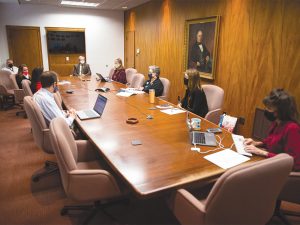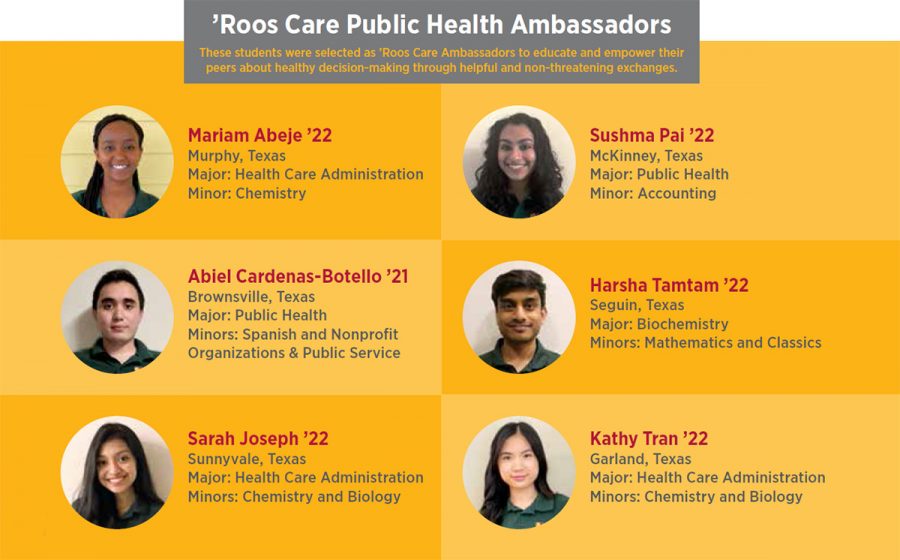By Leigh-Ellen Romm
Saritha Bangara Helps Shape College COVID-19 Policy

 very morning, Monday through Friday, members of the President’s COVID-19 Health Task Force pull up to the big table in the board room to discuss what’s new—new in science, new in testing, and new cases of COVID-19 on campus. There, along with the administrators and staff, is Dr. Saritha Bangara, Co-Director of the Public Health Program and Assistant Professor of Public Health, who has become the expert, the voice, and the face of COVID-19 messaging on campus.
very morning, Monday through Friday, members of the President’s COVID-19 Health Task Force pull up to the big table in the board room to discuss what’s new—new in science, new in testing, and new cases of COVID-19 on campus. There, along with the administrators and staff, is Dr. Saritha Bangara, Co-Director of the Public Health Program and Assistant Professor of Public Health, who has become the expert, the voice, and the face of COVID-19 messaging on campus.
Saritha joined the Austin College faculty in 2015 as a Visiting Professor, teaching “Introduction to Public Health” alongside Professor Emeritus of Biology George Diggs, who had a vision for a new Public Health Program. While still a Ph.D. student of Epidemiology at University of North Texas Health Science Center, Saritha helped focus that vision into a reality—a reality that has grown into one of Austin College’s top majors.
Epidemiology combines Saritha’s desire to work with people with her interests in pathology, disease process, and statistics. She says that while doing research at Mayo Clinic she realized that 12 hours a day in the lab, although interesting, was not for her. People are important to her, and teaching fills her desire for interaction. In 2016, Saritha became a tenure-track faculty member and co-director, with Diggs, of the Public Health Program. Although her career in higher education and public health has had a fairly recent start, it is just in time for a global pandemic.
“In epidemiology school they talk a lot of pandemics,” she said. “You know, they talk about the Spanish flu and even HIV, but I did not imagine that I would have this experience of working with this new data. As weird as it sounds, it’s kind of exciting to have this opportunity.”
In January 2020, novel coronavirus and COVID-19 began to make its way to the newscasts and headlines. “Honestly in January, I didn’t think it was going to be this bad,” Saritha said. “However, by March, we knew it was going to be an explosion of cases. It’s a terrible time for a lot of people, but I feel like we are trying to make a difference and are able to do so with education. If we want to prevent deaths and infections, prevention stems from understanding,” she said.
 At Austin College, Saritha works with the COVID-19 Health Task Force to educate the community and enforce protocols that have kept students, staff, and faculty safe. After students left campus in March 2020, the team took the time necessary to prepare for their return in fall.
At Austin College, Saritha works with the COVID-19 Health Task Force to educate the community and enforce protocols that have kept students, staff, and faculty safe. After students left campus in March 2020, the team took the time necessary to prepare for their return in fall.
“From June through August, testing was still not widely available,” she said. “We were not able to accomplish as much from an epidemiological perspective then. But, so much has happened in such a short time,” she said. As an epidemiologist on the Health Task Force, Saritha blurs the lines between faculty and administration as she contributes her expertise to important policymaking for the College.
“I feel very comfortable,” she said. “I think here, if you can justify and show data about why you think something will work, it is easy. One thing I pushed for the entire summer was, we have to test,” she said. “The masks, distancing, and hand washing are great. But, testing does pick out the asymptomatic people who are walking around with their friends and with the virus. If not for testing, it’s really hard to identify that.”
The campus had only 22 cases between mid-September when testing became available and Thanksgiving Break. A communication campaign of signs, flyers, reminders through the College’s AC Mobile App, and videos set on repeat in major campus buildings helped remind students of the necessary protocols: wear a mask, wash your hands, and stay at least six feet apart. In a video sent to students and their parents, Saritha herself delivers a warm, yet firm, message regarding behavior that can lead to exposure, such as parties. Just don’t, she says.
Then she introduced one of the most powerful influences of all, peer pressure. In October, the College launched the ’Roos Care Public Health Ambassador Program, with Saritha as advisor. The program provides guidance from students to students about healthy behaviors and social norms related to COVID-19. Six students were selected from applicants to educate and empower others about healthy decision-making through helpful and non-threatening exchanges.
 Saritha expects ’Roos Care Ambassadors to continue long after COVID-19 is under control. “We anticipate after COVID, which will be awhile, there will be plenty to do. The ambassadors will work to inform their peers on the health dangers of tobacco and alcohol. When flu season comes, the ambassadors will educate students about how to stay healthy regardless of the season or the temptations.”
Saritha expects ’Roos Care Ambassadors to continue long after COVID-19 is under control. “We anticipate after COVID, which will be awhile, there will be plenty to do. The ambassadors will work to inform their peers on the health dangers of tobacco and alcohol. When flu season comes, the ambassadors will educate students about how to stay healthy regardless of the season or the temptations.”
“I can tell students all I want about the risks of alcohol use,” Saritha explained. “But, when it comes from a peer, they can get a conversation going. We can continue the ambassador program in many ways. I don’t see it ending.”
For an epidemiologist, a pandemic is a bit of an adrenaline rush—but not one that anyone wants to go on forever. “This is the busiest semester of my life, even more than my last as a Ph.D. student,” she said. Even with teaching responsibilities, supervising the ambassadors, attending daily task force meetings, and hosting weekly COVID-19 information sessions via Zoom, Saritha has a new research project coming up—completely unrelated to COVID.
In early November 2020, she was awarded a $90,000-plus grant from The Discovery Foundation for her project, “Women’s Health Education for Victims of Intimate Partner Violence at the Grayson Crisis Center.” Studies have shown that women who report a history of domestic abuse are at greater risk for a variety of illnesses, such as heart disease and cervical cancer.
Saritha and her team of student researchers, working in partnership with Grayson Crisis Center, will conduct focus groups with Crisis Center clients to learn about their health issues and develop interactive health education modules. This will benefit the clients, the Crisis Center, and the students who will have a learning opportunity usually reserved for graduate-level work.
While others may be wondering if COVID-19 will ever end, Saritha is capitalizing on the opportunity to do what she does best and enjoys most—learning about disease and working with people to keep them healthy.

